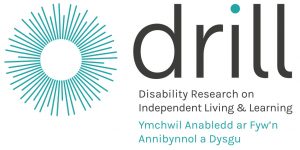Latest news
The funding for Legally Disabled has now closed but you can still get in touch with queries or requests.
Please email lead researcher, Prof Debbie Foster, on FosterD1@cardiff.ac.uk
Go to our Research Reports page to view our findings, recommendations and follow-up work.
What was the ‘Legally Disabled?’ project?
Not enough was known about the experiences of disabled people in professional occupations. They are largely absent in academic research, their presence, seemingly unexpected. The premise of this project is that disabled people are both ambitious and talented, however, they need to be ‘seen’ and ‘expected’.
The research investigated and mapped out the negative and positive experiences, choices and views of qualified disabled people working or seeking to work in the legal profession.
We included people with health conditions and impairments who may not define themselves as being disabled, as well as those who do.
If you’d like to know more, take a look at the page explaining how disability can be defined.
The success of the project relied on disabled legal professionals having full involvement in the design and delivery of the research. This ensured that we focused on the issues that you’ve identified as your priorities and support partner groups, to improve their ability to engage with and co-produce future research studies.
We produced a report and other material such as blog posts and papers from the research in order to share the findings and influence policy and practice across the legal profession and beyond.
What we investigated
We explored the experiences of disabled people in the legal profession to discover:
- What barriers exist to gaining employment and career progression and how these may influence the choices people make within the profession.
- What factors have proved successful in addressing or mitigating some of these barriers.
For example,
- How do employer attitudes impact on career opportunities and choices?
- What valuable skills do disabled professionals possess and are these recognised?
- Are there different experiences for disabled people entering the profession to those acquiring a health condition or impairment when their career is already established?
- What factors are important for disabled legal professionals in building success?
- How well understood are the range of physical, sensory, mental health and other conditions disabled people experience?
- Is adequate access and support available?
- Do people disclose conditions to employers or colleagues and what influences these decisions?
- What are the experiences of disabled legal professional who have other identities (eg relating to race, gender, sexuality and so on)?
From this research, we identified ways in which the legal profession can create change in order to become more inclusive and accessible for disabled people. We continued to work in coproduction with the Lawyers with Disabilities Division of The Law Society and can still consider requests for further engagement with other organisations.
Who we included
We explored the experiences of disabled people and people with health conditions (including mental health) working in the legal profession.
This research included:
- Solicitors
- Barristers
- Legal executives
- Clerks
- Those who are qualified but unemployed
- Lawyers who were once employed in the legal profession but have since left (and during the time employed, were disabled)
Participants included:
- Self-employed
- Work in small firms or large companies
- Full time or part-time
- A graduate undertaking recognised legal training to qualify to practice
- Non-graduates undertaking recognised vocational training to qualify to practice.
Who we could not include:
- We did not include undergraduates who are currently studying a law degree.
- The study is confined to England and Wales.
Perhaps you chose to work in a specific area of law because you felt it would be more accessible and easier to manage than other options. You may already have a well-established career but are now concerned about future progress due to an acquired health condition or impairment. Perhaps you chose to leave the profession because you didn’t have the support needed to manage your health or impairment around your work. Your experiences are all incredibly valuable for us to capture.
Information sharing with networks, firms and organisations
The research findings and recommendations were launched at our conference on the 24th January 2020. You can download the research reports here.
The project was set to conclude in May 2020 but due to the Covid19 pandemic, we continued to deliver roundtable events online to support organisations to learn about the research and discuss the recommendations.
If your network or organisation wishes to discuss the findings and how they can be implemented to improve disability inclusion, please get in touch with lead researcher, Prof Debbie Foster on FosterD1@cardiff.ac.uk
Covid report published
Our follow-up research, launched on the 2nd November 2020, explores how disabled lawyers have been affected by the Covid-19 pandemic. We worked in coproduction with the Lawyers with Disabilities Division of The Law Society on the research. Our findings show that increased remote working and more flexibility with reasonable adjustments could make the legal profession more accessible.
Click here for more information and links to the report.
Report launch and conference, 24th January 2020
We launched our research findings and recommendations on the 24th January 2020 at the British Academy in London. A report of conference will be published in due course. Thank you to all of our speakers and everyone who attended to make the day such a great success.
Interview and survey stages complete
Eight focus groups took place early in 2018 in London, Manchester, Cardiff and Birmingham with disabled legal professionals including para-legals, solicitors, barristers, judges, trainees and retirees.
The second stage of the project consisted of 55 one to one interviews. These explored individual experiences in more depth. Analysis of the interviews has been completed, drawing out the key research themes.
Survey stage complete
Our thanks to all who participated in and helped to promote research our two questionnaires: one for disabled people training for or working as Barristers and a second for disabled people training for or working as solicitors or paralegals. This also included those who have since left these roles in the profession.
We received almost 300 responses from people across the profession which enables us to set the qualitative findings against a robust quantitative dataset to show a fuller picture of the experiences of disabled people throughout the profession.
Groundbreaking new research
September 2017 marked the launch of an exciting new research project, “Legally Disabled? The career experiences of disabled people in the legal profession in England & Wales: developing future strategies.”
Prof. Debbie Foster of Cardiff University and independent researcher and photojournalist Dr Natasha Hirst undertook this research, the first of it’s kind. The Lawyers with Disabilities Division (Law Society) have been key partners in the development of the project which aims to co-produce research with disabled legal professionals. We are continuing to seek the involvement of other groups across the legal profession.
Funded by the Disability Research into Independent Living and Learning (DRILL) programme, the research will be investigating the barriers and solutions for disabled people across the legal profession.


